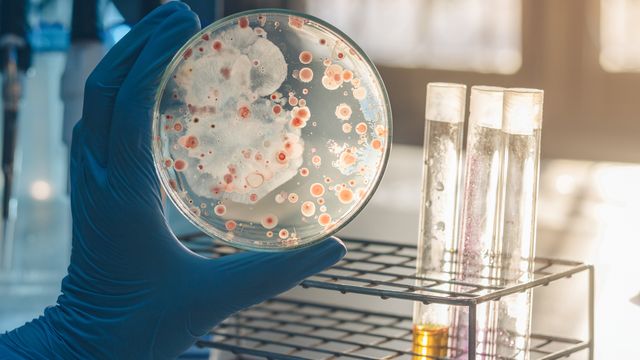Spoilage Yeast Culture Testing in Beverage Industry
The spoilage of beverages is a significant concern for the beverage industry. Spoiled products can lead to financial losses, reputation damage, and health hazards if consumed. One major cause of spoilage is the presence of spoilage yeasts which are responsible for off-flavors, aromas, and textures in fermented beverages such as beer, wine, and cider.
Yeast spoilage can occur due to various factors including contamination during processing or storage, improper sanitation practices, and inadequate quality control measures. To ensure product safety and maintain high standards of quality, it is crucial for beverage manufacturers to conduct regular Spoilage Yeast Culture Testing (SYCT).
Spoilage Yeast Culture Testing involves isolating and identifying spoilage yeasts present in the fermented beverages using microbiological methods. This process helps identify the specific types of spoilage yeast causing issues so that appropriate corrective actions can be taken by the manufacturer.
During this testing procedure, samples from different stages of production are collected and inoculated into specialized media designed to promote growth of spoilage yeasts. Once colonies form on these media plates, they are examined under a microscope or through other identification techniques such as PCR analysis for further confirmation.
The results obtained from Spoilage Yeast Culture Testing play a vital role in maintaining the integrity of fermented beverage products. They help manufacturers understand what steps need to be taken to prevent future occurrences by identifying potential weak points within their processes.
Accurate and reliable Spoilage Yeast Culture Testing also ensures compliance with international standards such as ISO 14025, which provides guidelines for the validation of methods used in environmental monitoring. By adhering to these standards, companies demonstrate their commitment towards producing safe and high-quality beverages while contributing positively to sustainability efforts.
Regular testing not only protects consumers from harmful contaminants but also enhances brand reputation by ensuring consistent product quality across all batches produced throughout the year. Additionally, implementing robust SYCT programs allows firms to maintain competitive advantage in today’s marketplace where consumer trust plays a key role.
Why It Matters
The importance of Spoilage Yeast Culture Testing cannot be overstated when it comes to safeguarding public health and maintaining brand reputation. Contaminated beverages pose risks not only to individuals who consume them but also to the overall industry. A single case of contaminated beverage can lead to widespread recalls, product withdrawals, and lawsuits.
Moreover, ensuring proper Spoilage Yeast Culture Testing is essential for meeting regulatory requirements imposed by governments around the world. These regulations aim at protecting consumer rights while promoting fair trade practices within industries. Failure to comply with these rules could result in fines or even closure of operations.
- Consumer Health: Ensures that consumed beverages are free from harmful microorganisms like spoilage yeasts.
- Brand Reputation: Maintains consumer confidence through consistent product quality and safety standards.
- Regulatory Compliance: Helps businesses stay compliant with local, national, and international regulations regarding food safety and quality assurance.
In addition to these benefits, Spoilage Yeast Culture Testing plays a crucial role in enhancing the sustainability practices of beverage companies. By identifying sources of contamination early on, manufacturers can implement more efficient waste management systems, reduce water usage during cleaning processes, and minimize energy consumption associated with recycling efforts.
Why Choose This Test
Selecting Spoilage Yeast Culture Testing as part of your quality assurance program offers several advantages that make it an indispensable tool for any beverage manufacturer. Firstly, the test provides precise information about the types and levels of spoilage yeasts present in your products. This knowledge enables you to pinpoint exactly where improvements are needed within your production line.
Secondly, Spoilage Yeast Culture Testing offers flexibility since it can be customized according to individual business needs. Whether you require tests for specific types of beverages or want broader coverage across multiple product lines, this service adapts easily to fit various requirements.
- Precision: Accurate identification and quantification of spoilage yeasts in your products.
- Customization: Tailored solutions that meet unique business needs.
Thirdly, choosing Spoilage Yeast Culture Testing supports long-term sustainability goals by helping you minimize waste generation and optimize resource utilization. By addressing issues early on through this testing method, companies can contribute positively to environmental conservation efforts without compromising profitability or customer satisfaction.
Lastly, implementing Spoilage Yeast Culture Testing demonstrates your commitment to maintaining high standards of quality and safety in beverage production. This proactive approach fosters trust among stakeholders including employees, customers, investors, and regulators alike.
Environmental and Sustainability Contributions
The implementation of Spoilage Yeast Culture Testing contributes significantly to the overall sustainability goals of beverage manufacturers by promoting more efficient resource use and waste reduction. By identifying sources of contamination early on through this testing method, companies can implement targeted measures aimed at reducing water consumption during cleaning processes.
- Water Efficiency: Reduction in water usage associated with cleaning operations helps conserve precious resources.
- Energy Savings: Implementation of optimized waste management systems leads to lower energy costs related to recycling activities.
Moreover, Spoilage Yeast Culture Testing supports responsible packaging decisions by enabling manufacturers to select materials that are less prone to microbial growth. This not only reduces the risk of spoilage but also decreases landfill contributions from expired products.
In addition, implementing this testing method aligns with global trends towards circular economy principles which emphasize minimizing waste generation and maximizing resource recovery. By adopting Spoilage Yeast Culture Testing into their quality assurance programs, beverage companies demonstrate their dedication to environmental stewardship while simultaneously enhancing operational efficiency and cost-effectiveness.





